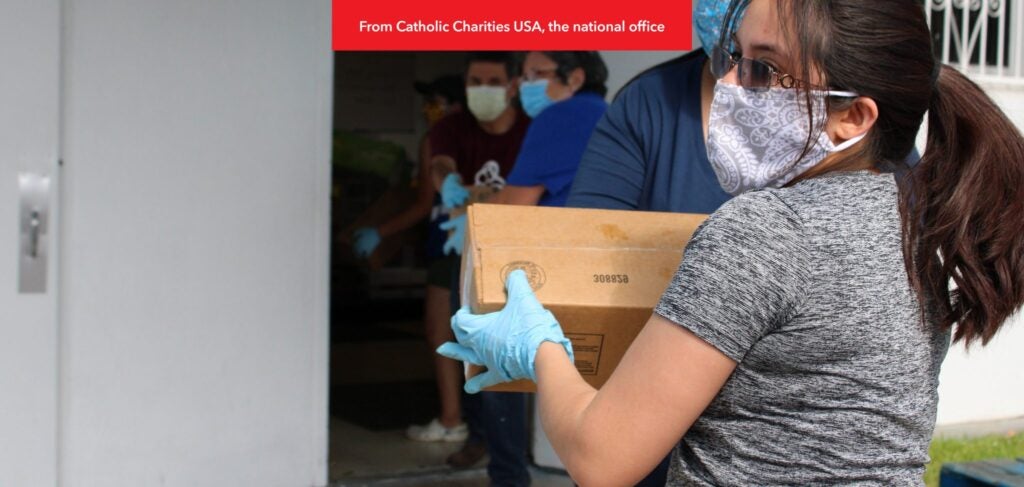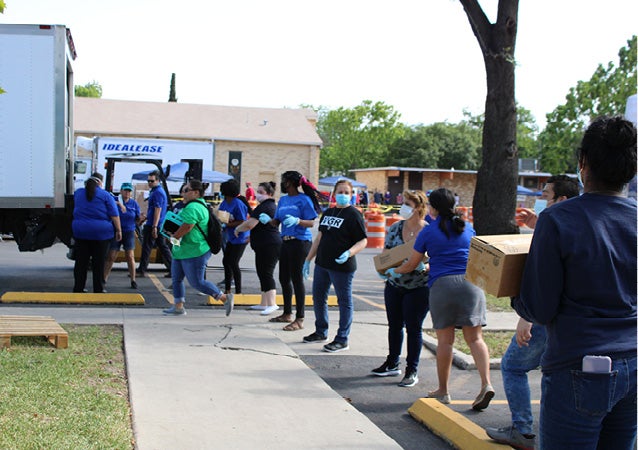

By Scott Hurd, Vice President, Leadership Formation, CCUSA
Following a disaster, impacted communities typically gather together to pray: for help and hope, survivors and victims, resiliency and recovery. But that wasn’t possible after the coronavirus hit, as church doors were shuttered to help prevent spread of the disease. At the same time, parish programs were cancelled and volunteers found themselves isolating at home, leaving Catholic Charities agencies and the parishes with which they collaborate bewildered and wondering what to do next.
But not for long. Following the initial shock, parish social ministers pivoted to new ways of serving their communities and engaging with volunteers. Older volunteers, no longer able to safely staff food pantries, instead made “wellness check” phone calls to the homebound elderly and other vulnerable persons. Younger volunteers, especially college students finding themselves back from school, stepped in to take up the slack, even delivering groceries to those for whom it was risky to leave their homes. “Grab and go” replaced “client choice” at food pantries, and some parish parking lots became major Catholic Charities food and diaper distribution sites.

Parish social ministry leaders seized the moment to foster participation in the U.S. Census, encourage parishioners to write their lawmakers to advocate for important social policy issues, and promote Catholic social teaching. Prayer services and liturgies were streamed online, providing essential religious and social connection. Thousands were challenged and inspired by reflections emailed each morning by Catholic Charities USA, connecting the day’s Mass readings with the Church’s ministry to those in need. Thanks to the expansion of teletherapy services by multiple Catholic Charities agencies, many parishioners were able to easily access mental health care at home at a time when demand for such services increased. And, in the face of massive unemployment and financial strain, ministry leaders helped those impacted apply for SNAP benefits, especially those who never had to receive them before.
During the pandemic’s initial weeks, Catholic Charities USA conducted video conferences for parish social ministry leaders across the country, allowing them to connect for mutual support and the sharing of best practices and new initiatives. Later, online conferences featuring Catholic Charities content experts stressed the need to understand the pandemic as a disaster, explored strategies for how parishes can safely reopen while helping parishioners feel safe, and considered how Catholic Charities agencies can effectively engage with parishes struggling with financial stress, or even downsizing.
After most disasters, it takes 18 to 24 months for a parish community to return to its pre-disaster strength. But the COVID-19 pandemic is not a typical disaster. Parishes are just now beginning to tentatively reopen, and generally at limited capacity. Even those parishioners who may wish to return may not feel safe to do so, especially vulnerable older persons and those with underlying health conditions. Yet as these communities continue to recover and journey toward a “new normal,” social ministers – both those with Catholic Charities and parish staff – will continue to collaborate with perseverance and creativity, providing help and creating hope.








